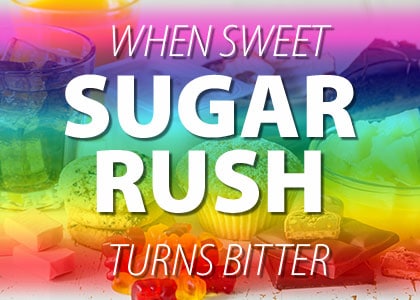 You’ve heard it before: too much sugar is not good for little bodies. Or, more precisely, added sugar is not good for people, big or small. The more we learn about how sugar affects the body, the more we realize that additional sugars have many downsides for health. This is particularly true of dental health. Sugar can cause serious problems for tiny teeth.
You’ve heard it before: too much sugar is not good for little bodies. Or, more precisely, added sugar is not good for people, big or small. The more we learn about how sugar affects the body, the more we realize that additional sugars have many downsides for health. This is particularly true of dental health. Sugar can cause serious problems for tiny teeth.
A sugar rush is a real thing, and it can be no joke. Sugar is a simple source of energy that the body can use very quickly to make energy. Because the body uses it so quickly, the sugar rush is generally followed by a sugar crash when the body runs out of the high-energy sugar.
The human body isn’t the only thing that feeds quickly on the simple sugar. The bacteria in your child’s mouth also like to feed on sugars. When they eat sugary foods or drink high-sugar drinks, the bacteria in their mouth begin to feast. This lets the cavity-causing bacteria grow quickly, making lots more bacteria.
Sugar doesn’t just feed decay-causing bacteria in the mouth. It also changes the pH balance of the mouth. The pH is a way to measure if an environment is acidic, basic (the opposite of acidic), or neutral. Sugar tips the balance of the mouth toward acidic. This is a problem, since the bacteria that cause cavities to grow and thrive in an acidic environment.
The acid, in addition to helping the bacteria overgrow, softens the minerals in the tooth enamel. If the acidic environment sticks around instead of returning to neutral soon, the minerals can be washed away instead of reabsorbed. The loss of minerals causes serious damage to the teeth. The demineralized areas are more susceptible to cavities, particularly since the cavity-causing bacteria are present and thriving.
It’s important to remember that the damage sugar can do to your children’s health goes beyond cavities. Too much sugar can contribute to obesity and diabetes, both of which bring additional risks for oral health. A diet high in refined and added sugars contributes to fat accumulation in the body.
Worse still, sugar causes the brain to release dopamine, the feel-good chemical that causes sugar to be addictive. The more sugar your children eat, the more sugar they will want. The more they want, the more damage it can do, both to their overall health and their dental health. Do your children (and yourself) a favor, and limit added sugars in their diet. Their improved health will thank you, even if they aren’t likely to do so themselves.
Sugar itself does not directly cause the tooth to fail. Rather, it starts a cascade that causes cavities. In that sense, cavities are like a side effect of sugar. Avoid the sugar roller coaster of energy rushes and dives, the acid spikes, and teach your children healthy habits that will serve them well their whole lives.
If you have any questions about sugar or anything related to oral health, or would like to schedule a visit with your Benbrook dentist, Drs. Cindy & Ryan Knight at Chisholm Trail Dental, please contact us today to make an appointment. We would be more than happy to help your little one learn the importance of a healthy smile and body. Isn’t that sweet!?
The content of this blog is not intended to be a substitute for professional medical advice, diagnosis, or treatment. Always seek the advice of qualified health providers with questions you may have regarding medical conditions.

Chisholm Trail Dental, PLLC
A Proud Member of the Benbrook Area
Chamber of Commerce
| Monday | By appointment only |
| Tue / Wed / Thu | 8:00AM - 5:00PM |
| Friday | 8:00am - 2:00pm |